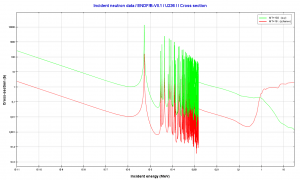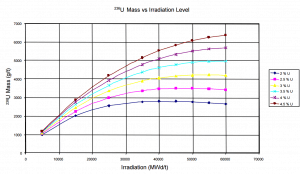Uranium 236
Uranium 236 is not a naturally occurring isotope of uranium. It is a manufactured isotope found in spent nuclear fuel or reprocessed uranium. The presence of this isotope in a sample of uranium is evidence that the sample has been in a nuclear reactor. Isotope 236U is formed in a nuclear reactor from fissile isotope 235U. Most absorption reactions result in fission reaction, but a minority results in radiative capture forming 236U. The cross-section for radiative capture for thermal neutrons is about 99 barns (for 0.0253 eV neutron). Therefore about 15% of all absorption reactions result in radiative capture of neutrons. About 85% of all absorption reactions result in fission.
 This isotope has a half-life of 2.34×107 years and has a longer half-life than any other artificial actinide or fission product produced in nuclear reactors. 236U has about 190 times higher specific activity than the isotope 238U. This is due to the fact 238U has a half-life of about 190 times as long as 236U. This results in a high contribution to the radioactivity of reprocessed uranium. The amount of 236U present in spent nuclear fuel is directly proportional to the burnup levels and is dependent on initial 235U enrichment. For discharged fuel around 50 MWd/tU HM and enrichment of 4% of 235U, it is typically around 0.5 wt%.
This isotope has a half-life of 2.34×107 years and has a longer half-life than any other artificial actinide or fission product produced in nuclear reactors. 236U has about 190 times higher specific activity than the isotope 238U. This is due to the fact 238U has a half-life of about 190 times as long as 236U. This results in a high contribution to the radioactivity of reprocessed uranium. The amount of 236U present in spent nuclear fuel is directly proportional to the burnup levels and is dependent on initial 235U enrichment. For discharged fuel around 50 MWd/tU HM and enrichment of 4% of 235U, it is typically around 0.5 wt%.
236U decays via alpha decay to 232Th. 236U occasionally decays by spontaneous fission with a very low probability of 0.00000009%.
236U is neither a fissile isotope nor a fertile isotope. 236U is fissionable only by fast neutrons. Radiative capture of a neutron leads to the formation of the isotope 237U, which quickly beta decays to the isotope 237Np. 237Np may absorb another neutron, thus resulting in the formation of 238Np, which quickly beta decay to 238Pu. The presence of this isotope certainly does not contribute to the neutron economy. On the other hand, the radiative capture cross-section for 236U is very low, and this process does not happen quickly in a thermal reactor.
See also: Neutron Cross-section
 Uranium 236. Comparison of total fission cross-section and cross-section for radiative capture.
Uranium 236. Comparison of total fission cross-section and cross-section for radiative capture. 236U content as a function of burnup level of a PWR fuel.
236U content as a function of burnup level of a PWR fuel.Source: IAEA-TECDOC-1529 Management of Reprocessed Uranium